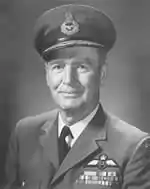Clarence Dunlap
Air Marshal Clarence Rupert Dunlap CBE, CD, (1 January 1908 – 20 October 2003) was a Canadian airman who, from 1962 to 1964, served as the last Chief of the Air Staff of the Royal Canadian Air Force before it was subsumed into the newly unified Canadian Forces. From 1964 to 1967 he was the deputy commander-in-chief of NORAD. In his later years, Dunlap was the last surviving Royal Canadian Air Force air marshal.
Clarence Rupert Dunlap | |
|---|---|
 Air Marshal Clarence Dunlap | |
| Born | 1 January 1908 Sydney Mines, Nova Scotia |
| Died | 20 October 2003 (aged 95) |
| Allegiance | |
| Service/ | |
| Years of service | 1928–1968 |
| Rank | Air Marshal |
| Commands held | No.6 Bombing and Gunnery School RAF Leeming No.331 (Bomber) Wing No.139 (Bomber) Wing No.64 (Bomber) Base Northwest Air Command Air Defence Command National Defence College Chief of the Air Staff |
| Battles/wars | World War II |
| Awards | Commander of the Order of the British Empire Canadian Forces Decoration Silver Star (USA) Croix de Guerre with gold star (France) |
Early career
Dunlap joined the Royal Canadian Air Force in 1928, earning his pilot's wings at Camp Borden in Ontario.
In his early flying career Dunlap was assigned to aerial photography duties when he mapped out large parts of Canada. Later, in the mid-1930s, he worked in air armament.[1]
World War II
On the outbreak of World War II, Dunlap was the Director of Armament at Air Force Headquarters. In 1942 he was promoted to group captain and took up command of the air armament school at RCAF Station Mountain View in Ontario.[2]
Dunlap was posted to the United Kingdom in late 1942, becoming Station Commander of RAF Leeming in Yorkshire in January 1943.[3] At that time Leeming was part of No. 6 Group in Bomber Command. Dunlap's time at Leeming only lasted until April 1943 and he was then given command of No. 331 (Bomber) Wing which comprised Nos. 420, 424, and 425 Squadrons operating the Wellington bomber in Tunisia and were used to support the invasion of Sicily and then Italy.[4][1] Later he was promoted to air commodore[5] and in January 1945 he was appointed Air Officer Commanding No. 64 Base headquartered at RAF Middleton St. George.[6]
Postwar
After the war, Dunlap was Commandant of the National Defence College (1951–1954). Promoted to air vice-marshal in 1954, he served as Vice-Chief of the Air Staff in 1954.[1] Returning to Europe in 1958, Dunlap was appointed Deputy Chief of Staff (Operations) at Supreme Headquarters Allied Powers Europe (SHAPE).[7] There he wrote and article for the European-Atlantic Review about the role of Europe's radar shield.
Dunlap was promoted to air marshal and served as Chief of the Air Staff in 1962.[1] His final service appointment was as the Deputy Commander of the North American Aerospace Defense Command (or NORAD) from 1964 to 1967.[1][8] He retired from RCAF in 1968.[1]
In retirement Dunlap worked on a voluntary basis to support the development of the National Aviation Museum in Ottawa. In 1979 Dunlap moved to Victoria in British Columbia where he retired from voluntary work. At his death in 2003, Dunlap was the last of the RCAF air marshals.
References
- Clarence Dunlap The Canadian encyclopedia
- "Air Marshal Clarence Rupert "Larry" Dunlap, CBE, CD, DCL, DEng, BSc". Archived from the original on 2011-05-25. Retrieved 2010-11-05.
- RAF Station Commanders - Yorkshire
- "Mitchell Men: Medium Bombers At War: Air Force, Part 56". Legion Magazine, April 7, 2013 by Hugh A. Halliday
- Richard Goette (9 July 2018). Sovereignty and Command in Canada–US Continental Air Defence, 1940–57. UBC Press. p. 285. ISBN 978-0-7748-3690-6.
- Bomber Command Bases Archived 2009-03-09 at the Wayback Machine
- Isabel Campbell (18 November 2013). Unlikely Diplomats: The Canadian Brigade in Germany, 1951-64. UBC Press. p. 170. ISBN 978-0-7748-2566-5.
- "Air Marshal Clarence Dunlap, CBE, CD, DCL, Royal Canadian Air Force". Rememberances, Canada and the Second World War: In the Air.. 2002. web.
External links
| Military offices | ||
|---|---|---|
| Preceded by S Graham |
Station Commander RAF Leeming 1943 |
Succeeded by H M Carscallan |
| Preceded by R E McBurney |
Air Officer Commanding No. 64 Base 1945 |
Succeeded by H B Godwin |
| Preceded by F R Miller |
Vice-Chief of the Air Staff 1954 – 1958 |
Succeeded by Unknown |
| Preceded by H L Campbell |
Chief of the Air Staff (RCAF) 1962 – 1964 |
Vacant No single national air power organization Title next held by W K Carr(As Commander, Air Command in 1975) |
| Preceded by C R Slemon |
Deputy Commander of NORAD 1964 – 1967 |
Succeeded by W R MacBrien |
